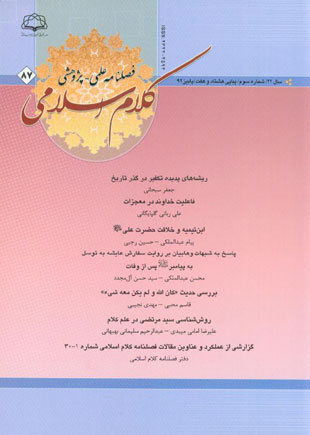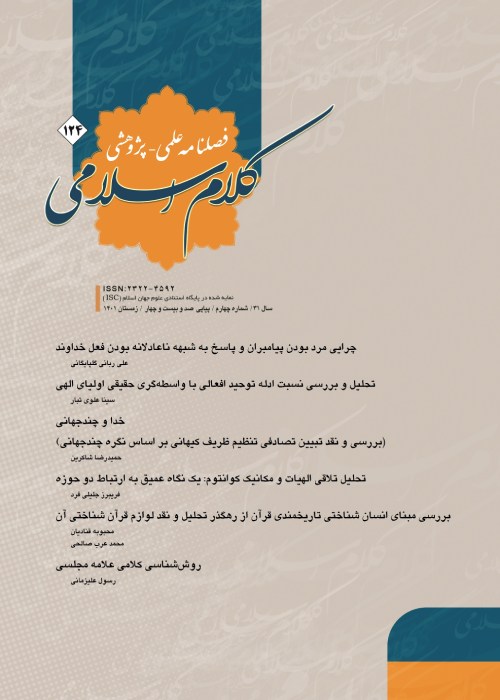فهرست مطالب

نشریه کلام اسلامی
پیاپی 87 (پاییز 1392)
- 168 صفحه، بهای روی جلد: 15,000ريال
- تاریخ انتشار: 1392/09/13
- تعداد عناوین: 9
-
-
صفحه 9پدیده زشت تکفیر که با قوانین اسلامی کاملا مخالف است، مگر در موارد مشخص که در عصر رسول خدا9 به وسیله «اسامه بن زید» و «ولید بن عقبه» صورت رگفت و هر دو مورد نکوهش قرار گرفتند. پس از آن دو، خوارج به این پدیده دامن زدند. ارزش های والای انسانی از نظر قرآن و سنت مانع از آن است که به این زودی خون انسانی هدر شمرده شود و پیامبر گرامی اسلام9 پیوسته با پذیرش دو شهادت از طرف مقابل، ایمان و اسلام او را می پذیرفت و هرگز پیرامون مسائل کلامی که دستاویز تکفیری هاست، سخن نمی گفت.کلیدواژگان: تکفیر، خوارج، تکفیری های معاصر، اسامه بن زید، ولید بن عقبه، ملاک ایمان، ملاک کفر، خلق قرآن
-
صفحه 19در اینکه وقوع معجزات مستند به مشیت و عنایت ویژه خداوند است، تردیدی وجود ندارد؛ اما درباره اینکه این استناد به صورت مستقیم است یا به واسطه نفوس و اراده پیامبران:، سه دیدگاه مطرح شده است. اشاعره بر اساس دیدگاه ویژه خود در توحید افعالی، معجزات را -همانند رخدادهای معمولی- افعال مستقیم خداوند می دانند. فلاسفه بر پایه اصولی همچون امتناع صدور بی واسطه متغیرات از خداوند، اصل سنخیت میان علت و معلول و قاعده الواحد، صدور بی واسطه معجزات از خداوند را ناممکن دانسته، وساطت نفوس و اراده پیامبران: را لازم شمرده اند. متکلمان عدلیه هر دو قسم را ممکن دانسته، و تعیین اینکه معجزات پیامبران: از کدام قسم است را به آیات و روایات گزارش گر معجزات ارجاع داده اند. در این نوشتار با اثبات نادرستی دیدگاه اشاعره و فلاسفه، درستی دیدگاه متکلمان عدلیه اثبات شده است.کلیدواژگان: معجزه، فاعلیت الهی، نفس ناطقه، اشاعره، فلاسفه، عدلیه
-
صفحه 43ابن تیمیه به عنوان ایدئولوگ تفکر سلفی گری و وهابیت دارای تفکرات خاصی است. در زمینه نقد و بررسی افکار نامبرده کتاب ها و نوشته های فراوانی وجود دارد. مقاله حاضر در صدد است نظرات ابن تیمیه در باب خلافت امیرالمومنین علی7 را اولا گردآوری، و ثانیا مورد نقد و بررسی قرار دهد، و مشخصا به دنبال پاسخ این دو پرسه است که: آیا وی خلافت امیرالمومنین7 را قبول دارند یا خیر؟ و دیگر اینکه: آیا نحوه برخورد او با آن حضرت مانند نحوه برخوردش با دیگر خلفاست، یا اینکه در مواجهه با آن حضرت به طعن، تضعیف و تشکیک پرداخته است؟ براین اساس با روش مطالعه کتابخانه ای به بررسی آثار ابن تیمیمه پرداخته و در انتها از طریق تحلیل گفته ها، سعی می نماید به عقیده نامبرده در این زمینه دست یابد. نتیجه اینکه: سخنان ابن تیمیه درباره خلافت امیرالمومنین7 هماهنگ و یکنواخت نیست. در برخی عبارات آن حضرت را آخرین خلیفه از خلفای راشدین دانسته است، ولی در عباراتی دیگر مشروعیت خلافت آن حضرت را مورد تشکیک و تردید و حتی مورد طعن و قدح قرار داده است.کلیدواژگان: امیرالمومنین علی (ع)، ابن تیمیه، منهاج السنه، خلافت
-
صفحه 89حدیث «کان الله و لم یکن معه شیء» از احادیث معروفی است که مضمون آن در روایات بسیاری بیان شده است. درباره مفاد آن از سوی متفکران اسلامی، آراء مختلفی مطرح گردیده است. عده ای آن را بر پایه حدوث زمانی، و گروهی بر پایه حدوث ذاتی و برخی نیز بر اساس وحدت وجود به شرح و تبیین آن پرداخته اند. مقاله حاضر در صدد است پس از بررسی متن و سند حدیث، آراء متفکران اسلامی در این زمینه را نقل و بررسی نماید.کلیدواژگان: حدیث کان الله و لم یکن معه شیء، حدوث زمانی، حدوث ذاتی، وحدت وجود، کان تامه، کان ناقصه
-
دین و عقلانیت / گزارش جلسه دفاعیه پایان نامه مقطع دکتریصفحه 149
-
صفحه 151
-
Page 9The gross phenomenon of excommunication (takfir) which with the exception of some specific instances, totally contrasts with the Islamic rules, was committed in the era of the holy prophet (s) by Usamah b. Zayd and Valid b. Ughbah but the both were condemned by the prophet. After them, Kharijites provoked the phenomenon. According to the perspective of the Qur’an and the Sunnah, sublime human values reject that the blood of a man be shed in vain soon. The noble Prophet of Islam always accepted the faith and Islam of any one merely with the acceptance of his or her two testimonies and never spoke about theological problems that are a pretext in the hands of takfiries.Keywords: excommunication (takfir), Kharijites, contemporary Takfiries, Usamah b. Zayd, Valid b. Ughbah, criterion of faith, criterion of blasphemy, creation of the Quran
-
Page 19There in no doubt that the occurrence of miracles is attributed to the special will and providence of God and about whether this attribution is direct or with the mediation of the souls and the wills of the prophets, three views have been posed. Based on their specific view about the unity of Divine Acts, Ash’arites believe that miracles like other usual occurrences are from direct Divine Acts. Based on principles like impossibility of direct effusion of variables from God, the principle of cognation between cause and effect and the rule of the One (the One dose not emanate but the one), philosophers believe that the direct effusion of the miracles from God is impossible but the mediation of the souls and the wills of the prophets is necessary. Finally, while the theodicean theologians regard the both kinds as possible, but to specify whether the Divine action in a miracle is direct or indirect they refer to the Qur’anic verses and Islamic narrations that reported the miracles. Proving the inaccuracy of the views of Ash’arites and philosophers, the present article established the accuracy of the view of the theodicean theologians.Keywords: miracle, God's action, intellective soul, Asharites, philosophers, theodicean theologians
-
Page 43As the ideologue of Salafi thought and Wahhabism, Ibn Taymiyyah has particular thoughts. There are many books and articles aiming to study and criticize his views. The present article aims firstly to gather Ibn Taymiyyah’s views on Imam Ali’s caliphate and secondly to criticize and scrutinize them and specifically tries to answer these two questions of whether he accepts Imam Ali’s caliphate or not? In addition, whether he treats Imam Ali as the other caliphates or he treats the Imam with blaming, weakening his authority and casting doubt on his personality? So based on the method of archival research the article studied Ibn Teymiyyah’s works and finally through analyzing the statements tries to gain his opinion in this matter. The result is that Ibn Tayymiyyah’s statements about Imam Ali’s caliphate are not steady and coherent: in some of his words, Ibn Taymiyah considered the Imam as the last caliph of the rightly guided caliphs but elsewhere he cast doubts about the legitimacy of the Imam’s caliphate and even subjected it to the blame and calumniation.Keywords: the commander of the faithful (Ali), Ibn Taymiyyah, Menhaj as, Sunnah, caliphate
-
Page 59From among the narrations quoted in the chapter of resorting (tawassul) in theological books is a narration quoted from A’ishah, the holy Prophets wife. According to the narration, in a famine, people opened a hole in the roof of the tomb of the prophet (s) so it rained by the grace of God. The Wahhabis, who regard resorting as unlawful and innovation in religion, always have been posed doubts about the chain of transmitters and the signification of the mentioned narration so those who appose them in opinion could not use the narration at all. Nonetheless regarding the chain of transmitters the narration is well authorized and regarding the content, it signifies the occurrence of resort (tawassul) to the Prophet after his demise and none of the doubts raised by the Wahhabis is acceptable.Keywords: resorting (Tawassul), resorting to the holy Prophet, Aishah's advice on resorting, responding to the doubts of Wahhabism
-
Page 89The narration “there was God and there was nothing with him” is one of the known traditions which its content has been expressed in many other narrations. The Islamic thinkers have posed different views about its significance. Based on the each principle of the unity of existence or essential contingency or temporal contingency, different Islamic thinkers have explained and interpreted the narration differently. The present article aims to study the chain of transmitters and the text of the narration and then to pose and study the views of the Islamic thinkers in this matter.Keywords: There was God, there was nothing with him, temporal contingency, essential contingency, simple whetherness, composite whetherness
-
Page 107Following his intellectualist teacher - Sheykh Mufid- and as a scholar who was educated in the school of Baghdad, Sayyid Murtada regarded a special status for intellect in theological discussion and took benefit from rational reasons extensively in his argumentations. Nevertheless, he did not neglect the textual proofs and used this cognitive method in its due place. This approach and method caused sayyid’s several theological works to be appeared which beside their rational smell and color possessed the textual heritage too; the works that rightly could play an effective role in fixing Shi’a School and removing the objections and doubts of the opponents. Although Sayyid Murtada fallows the way established by Shaykh Mufid in confronting extreme traditionalism and intellectualism, but there some differences in opinion between these two thinkers in some issues.Keywords: Sayyid Murtada, Shaykh Mufid, methodology, theological method, intellectualism


